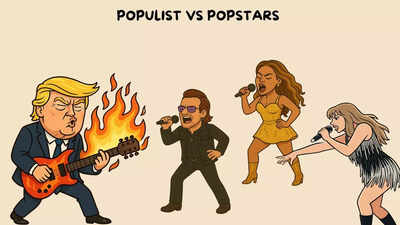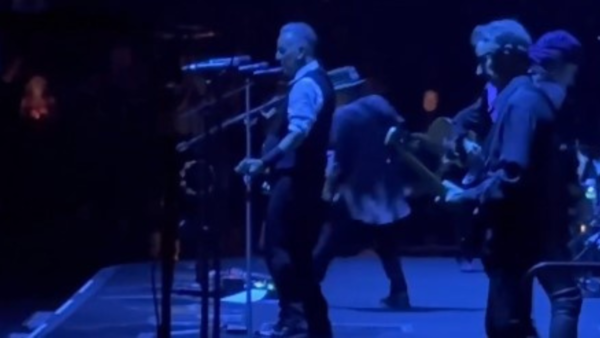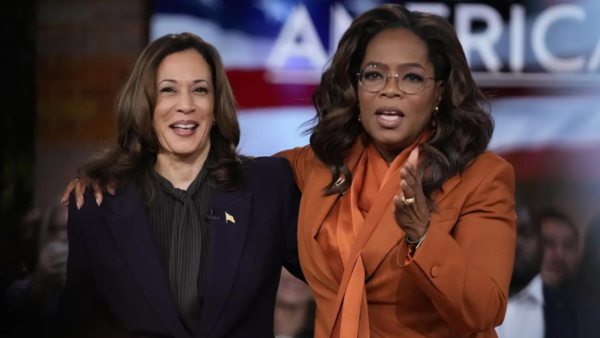
Donald Trump’s rise from New York real estate notoriety to right-wing demigod has always danced awkwardly alongside celebrity culture. In the 1980s and ’90s, he was the ultimate tabloid mascot—hosting Miss Universe, starring in The Apprentice, and lingering at Manhattan galas he could buy into but never quite belong to.
For the cultural elite, Trump was always too loud, too nouveau, too gold-plated. He was the outsider banging on the door, trying to get a table at the grown-up’s club.But when he entered politics, Trump stopped knocking. He kicked the door down and called the room a swamp. His once-insatiable thirst for celebrity validation curdled into something more useful: populist rage. From Hollywood to Spotify playlists, he redrew the map of American elitism—and declared war on it.
Pop stars weren’t just entertainers anymore. They were emissaries of the enemy.
Taylor Swift: The Pop Star Who Broke the Internet—and Trump

Fans believe Taylor Swift’s floral outfit may be a subtle hint at ‘Reputation(Taylor’s Version)’ (Getty Images)
For years, Taylor Swift played it safe, keeping her lyrical daggers aimed at exes, not politicians. But by 2024, she was posting about voter registration and endorsing Kamala Harris with the precision of a digital strategist. Her social media call to action shook the electoral grid, sending millions scrambling to check their voting status.
Trump’s reaction? Fury dressed as performance art. “I HATE TAYLOR SWIFT,” he thundered in all caps on Truth Social, accusing her of losing her “hotness,” as if relevance were something bestowed by presidential decree. His press secretary later claimed, with a straight face, that he was simply commenting on her “political views.”But the truth cuts deeper. Swift isn’t just a singer in Trump’s eyes—she’s a threat. She speaks to a demographic Trump struggles to reach: young, suburban, female, socially liberal.
Her influence is potent, her fanbase mobilised, and her silence—when Trump flails at her—is deafening. For a man who needs to win every news cycle, that's infuriating.
Beyoncé: Freedom and Fury

Beyoncé’s entrance onto the political stage in 2024 was as precise as her choreography. At a Houston rally, she declared her support for Harris not as a celebrity, but “as a mother,” underscoring the stakes of the moment with her song Freedom echoing in the background.
It wasn’t just an endorsement—it was theatre with a purpose.Trump, ever the cultural critic, spun this into yet another conspiracy. He accused Beyoncé of accepting $11 million in hush-money-for-endorsement, called it an “illegal campaign contribution,” and bundled her with Oprah and Bono in his rhetorical rogues’ gallery. The facts—that her company received standard production fees—were irrelevant. In Trump’s calculus, celebrity support for Democrats isn’t just opposition.
It’s crime. Beyoncé never responded. She didn’t need to. Her mother rebutted the claims, and the symbolism of her appearance did the rest.
Bruce Springsteen: The Boss vs the Brand

Bruce Springsteen bashed Donald Trump administration at his UK program.
Bruce Springsteen has been haunting Republican campaigns since Ronald Reagan misread Born in the U.S.A. But his 2025 remarks during a European tour—calling Trump’s America “corrupt” and “authoritarian”—hit a particularly raw nerve. The crowd in Manchester roared. Trump seethed.He called Springsteen “highly overrated,” a “prune,” and a “jerk,” launching one of the most creatively juvenile tirades to ever emerge from a sitting president. He also demanded an investigation into whether The Boss’s support for Harris amounted to illegal political financing. Springsteen didn’t respond. He didn’t have to. His fans, and the American playlist, already had their answer.
When Pop Becomes Politics
America has long flirted with the idea of celebrity-as-politician, but in the social media age, that flirtation has become a full-blown affair.
Taylor Swift can move voters with a single Instagram post. Beyoncé can turn a campaign rally into a cultural milestone. Springsteen can turn a tour stop into a civic sermon.Trump, a creature of television and ratings, knows this better than anyone. He doesn’t just attack pop stars—he tries to prosecute them in the court of public opinion. He paints their support for Democrats as part of a vast elite conspiracy, blurring the line between fan service and felony.And it works. In bashing popstars, Trump recasts himself as the lone gladiator standing between the forgotten American and a celebrity-industrial complex bent on globalist domination. Forget the Constitution—this is reality TV with stakes.
The New Cultural Cold War
Taylor Swift isn’t just a musician anymore—she’s a movement. Beyoncé isn’t just an icon—she’s a campaign surrogate. And Springsteen isn’t just a rock legend—he’s a patriot in open revolt.
Trump recognises this—and so do his opponents.But this isn’t just about music, or politics, or even influence. It’s about who gets to define the soul of America. Celebrity, in the 21st century, is soft power. And in the theatre of American politics, that power can move millions—or enrage them.Trump’s approach is simple: mock it, investigate it, destroy it. His opponents’ strategy? Shine brighter, sing louder, and hope the crowd sings back.
But Does It Work?

Kamala Harris and Oprah Winfrey
Despite an arsenal of celebrity endorsements, the 2024 election was a cold reality check for the Democrats. Swift told millions to vote. Beyoncé rallied crowds. Springsteen sang. And yet, Trump still won—largely by dominating the white working class and making fresh inroads with Latino men. In key swing states, Hollywood glitter clashed awkwardly with rust-belt grit.Post-election, Democrats privately admitted the obvious: celebrity firepower isn’t enough.
In fact, it may have backfired. Star-studded rallies reinforced Trump’s “them vs us” narrative, where every pop anthem and red-carpet speech became further proof of a sneering elite. For many voters, especially in towns where the factories are gone and the fentanyl isn’t, Swifties and strobe lights felt like a different planet.The lesson? Star power makes noise—but Trump makes contact. He might not sing, but his populist anthem hits closer to home for millions of Americans. In towns hollowed out by deindustrialisation and distrust, his message—raw, repetitive, and resolutely anti-elite—still resonates louder than any stadium tour or Instagram story. Pop stars may light up the charts, but Trump continues to command the crowd. For now, at least, Main Street is still humming his tune.

 1 month ago
130
1 month ago
130




























 English (US)
English (US)